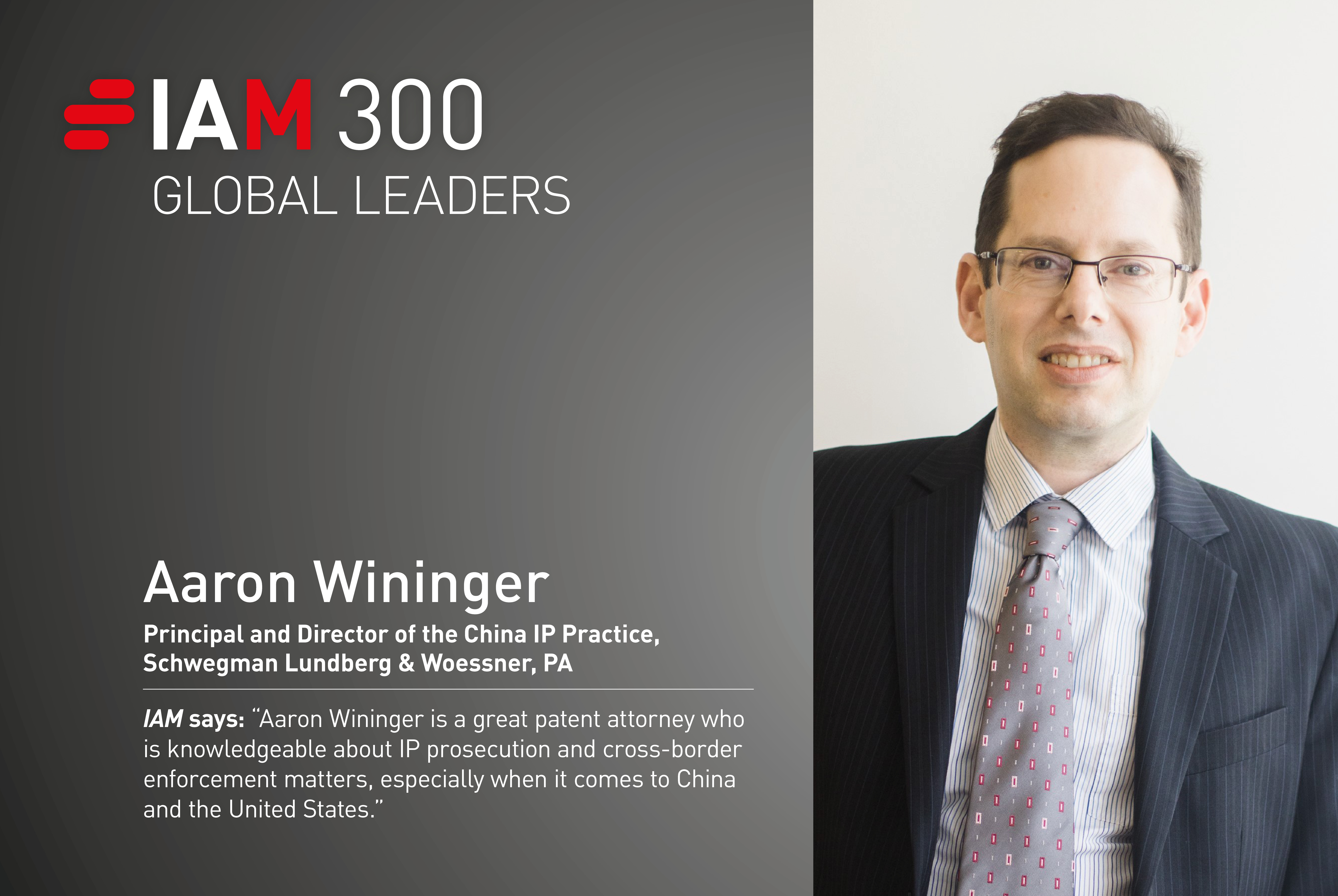Aaron Wininger
As principal and director of the firm’s China IP practice, what does inspiring leadership look like to you?
For me, inspiring leadership is about providing quality training to junior attorneys and giving them opportunities to grow professionally, such as regular client interaction, speaking and writing opportunities, firm leadership positions and participation in IP associations, such as the IP Practice in China committee of the American Intellectual Property Law Association.
If you could make three changes to China’s prosecution landscape, what would they be and do you think they are likely to happen?
I think the two most crucial changes to China’s prosecution landscape would be the release of the Implementing Regulations of the Patent Law and the Examination Guidelines. The Patent Law was amended for the fourth time in 2020 and introduced many new features, such as patent-term adjustments, patent-term extensions and partial designs. However, as the Implementing Regulations have not been officially released yet, it is unclear how these new features will work in practice despite it being more than three years since the amendment. Similarly, the Examination Guidelines would also provide guidance on these new features and would be especially critical for understanding how partial designs would be examined. In terms of when I expect these releases, I can only say that I hope it is soon, as clarity is needed.
Another key change I would make would be to initiate a low-level inventiveness examination of utility model applications. As there is currently no official substantive examination of utility model applications, many junk utility model applications are filed, which skew statistics, waste resources at the China National Intellectual Property Office (CNIPA) and complicate freedom-to-operate analyses. The CNIPA may have already initiated this change by cracking down on irregular patent applications. Utility model grants in the first half of 2023 were already down by 25% (in contrast to a 10% increase in invention patent grants).
As an IP strategist in Asia, what is your opinion on how the business landscape there has evolved over the years with respect to IP appreciation and adoption?
There is certainly a greater appreciation and respect for intellectual property in China. The new Civil Code and Patent Law introduced up to five times more punitive damages for intentional IP infringement. We are also starting to see more enforcement of trade secret rights, including a vanillin food flavouring case that yielded 159 million yuan in damages, a semiconductor case leading to a 60 million yuan settlement and a recent targeted molecule lawsuit requesting 99 million yuan in damages.
As more and more industries are affected by technological convergence, what considerations should patent owners bear in mind when assessing their existing IP strategies?
I have seen technological convergence with Chinese companies participating more frequently in standard-setting bodies instead of attempting to develop China-only standards (eg, the WLAN Authentication and Privacy Infrastructure). However, the Supreme People’s Court has repeatedly affirmed the right of Chinese courts to set worldwide royalty rates for SEPs when there is a China nexus, usually at lower rates than would be set in foreign jurisdictions. Accordingly, SEP holders may want to minimise their China nexus – by reducing their patent filing in China, license their patents solely on a country-by-country basis and avoid in-person negotiating in China.
In your view, what makes a top-tier portfolio management strategy?
The basis for any top-tier patent portfolio management strategy should be to first understand what the goal for the portfolio is – defensive only, or offensive. If offensive, you must know your offensive goal; to generate revenue, block competitors or a combination of the two. You must then decide where and against whom you will enforce. Only once you know these goals can you generate a top-tier portfolio management strategy. It is also crucial to know when to prune your portfolio to minimise expenses related to annuities and maintenance fees.
Aaron Wininger
Principal and Director of the China IP Practice
[email protected]
Aaron Wininger is a principal and director of the firm’s China IP practice. He counsels US and Chinese companies on patent and trademark portfolio development, non-infringement and invalidity opinions and cross-border enforcement. Mr Wininger has worked with clients in the areas of software, networks, lasers, medical devices, semiconductors and physics. His knowledge of both the Chinese and American markets allows him to advise his clients as they expand and enforce their IP portfolios.
